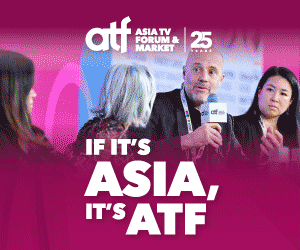
British Asian actress Sunetra Sarker became an actress by chance and a poster-person for Asian women with attitude by choice. As her latest TV series makes its way around the world, she is also speaking up for greater diversity off-camera.
Sunetra Sarker became an actress because U.K. daytime drama Brookside needed a brown face and a casting agent happened to drive past the bus stop where the teenage Sarker was waiting. “That basically meant they couldn’t find any Asian actresses... I had no thought of acting becoming my career. I was just happy to tell my school friends that I’m going to be on TV,” she says.
Fast forward to today, and Sarker is one of the actors flying the flag for big-attitude Asian women who aren’t stereotypical South Asian shopkeepers’ wives with six lines and hidden personality. Actually, she didn’t mean to do that either, she says as her latest drama – six-part contemporary thriller, Informer – premieres.
Sarker, born and brought up in Liverpool to middle-class Indian Hindu parents from Calcutta, plays Pakistani Muslim Sadia Shar, the mother of a reluctant informer in contemporary London. The character is witty, independent, runs her own beauty salon, doesn’t sleep with the man everyone thinks is her husband, and has a few secrets. “There were so many clashes of stereotypes that I liked,” she says.
In a way though, her earlier roles clashed more loudly with her heritage. Born in 1973 the year after her parents emigrated to the U.K., Sarker “was very much thrown into the world of a first-generation Asian girl, born and brought up in England with this heritage that I really didn’t want to know much about. I was living in the present wanting to be as English as possible,as British as possible,” she says. “I was very much a British-before-Asian kind of youngster.”
Luckily, perhaps, because decent roles for Asian women were rare. “I wasn’t trying to be Indian in anything I was doing. I was really keen to not play the race card because there were no roles,” she adds. So she ended up auditioning for parts as Clare, Zoe, Angie or Jane. Her argument went something like this: “I might not look lik...
British Asian actress Sunetra Sarker became an actress by chance and a poster-person for Asian women with attitude by choice. As her latest TV series makes its way around the world, she is also speaking up for greater diversity off-camera.
Sunetra Sarker became an actress because U.K. daytime drama Brookside needed a brown face and a casting agent happened to drive past the bus stop where the teenage Sarker was waiting. “That basically meant they couldn’t find any Asian actresses... I had no thought of acting becoming my career. I was just happy to tell my school friends that I’m going to be on TV,” she says.
Fast forward to today, and Sarker is one of the actors flying the flag for big-attitude Asian women who aren’t stereotypical South Asian shopkeepers’ wives with six lines and hidden personality. Actually, she didn’t mean to do that either, she says as her latest drama – six-part contemporary thriller, Informer – premieres.
Sarker, born and brought up in Liverpool to middle-class Indian Hindu parents from Calcutta, plays Pakistani Muslim Sadia Shar, the mother of a reluctant informer in contemporary London. The character is witty, independent, runs her own beauty salon, doesn’t sleep with the man everyone thinks is her husband, and has a few secrets. “There were so many clashes of stereotypes that I liked,” she says.
In a way though, her earlier roles clashed more loudly with her heritage. Born in 1973 the year after her parents emigrated to the U.K., Sarker “was very much thrown into the world of a first-generation Asian girl, born and brought up in England with this heritage that I really didn’t want to know much about. I was living in the present wanting to be as English as possible,as British as possible,” she says. “I was very much a British-before-Asian kind of youngster.”
Luckily, perhaps, because decent roles for Asian women were rare. “I wasn’t trying to be Indian in anything I was doing. I was really keen to not play the race card because there were no roles,” she adds. So she ended up auditioning for parts as Clare, Zoe, Angie or Jane. Her argument went something like this: “I might not look like a Clare, but I sound like a Clare and I can act like a Clare so why can’t she look like me?”. Some went for it. Some didn’t. But she always “managed to find a successful route to not having to shine a spotlight on being Asian”.
It was only when she turned “about 30”, that she started “feeling quite proud of being Indian for the first time... it creeps up on you. I was getting married and having children. I enjoyed my friendships with my parents. I realised I had my own identity now and that is where I started I suppose, adapting myself to being open to trying Asian roles.”
What she won’t do is take a role for the sake of gender or race diversity. “I’m happy to play a terrorist if the story is about a terrorist and it’s a good story. I don’t want to just be a person in a show because you’ve ticked a box and said there is now a brown person in the show. I’m sure a lot of people will agree with me on that,” she adds.
Why did she take the Informer role? “Because there was so much intrigue in the first script. I couldn’t work out what was going to happen”.
Sunetra Sarkar
Sarker says she was gripped by page two – and the character she was auditioning for had not even appeared yet. “I wanted to know the story regardless of the part,” she says. When she did “meet” Sadia, she found a woman with sass – “that’s the word I use the most” – that Asian women don’t usually get a chance to show on television. “Having worked in TV for so long, I can spot a new character that hasn’t been shown on screen before,” she adds.
Informer is written by newcomers Rory Haines and Sohrab Noshirvani and produced by Neal Street Productions (Call The Midwife, Penny Dreadful) for BBC One. Amazon Prime Video has U.S. rights. Asia distribution by all3media International is pending. The series stars Nabhaan Rizwan as Raza, a second-generation Pakistani man from East London coerced by counter-terrorism officer Gabe (Paddy Considine) to become an informer. Bel Powley plays Gabe’s young and ambitious partner, Holly.
Sarker says Noshirvani, a New Yorker born in Iran, brought to the story an understanding of the complexities of extended Asian families; “We call a lot of people uncle and auntie. We call a lot of people our grandparents who aren’t really our grandparents... within that he managed to capture a mom who wasn’t really the mom.”
“A lot of family in my life have similar scenarios, aunties who looked afterthem after their parents had passed away. As it turns out in our story, Sadia is not Raza’s biological mother. She sacrificed her life when he was four or five years old to take care of him, his brother and his dad. I think that’s one of the reasons the bond is so strong for Raza to deceive the family. He’s trying to save Sadia because she has gone out of her way to look after them. He has a bigger debt to pay to her. That’s the reason I liked the script”. Sarker’s relationship with her on-screen son plays out against myriad characters managing double lives, coping with lies and deception.
Informer is not the first time Sarker has stepped into the Pakistani Muslim mother role. In Channel 4’s Ackley Bridge, she plays Kaneez Paracha, who finds out, among other things, that her daughter is gay and that her husband has a second family. “She’s the dinner lady at the school, rubbing shoulders with racists, and she’s just got bags of character. Again, she’s a woman who you don’t see on screen a lot. These are the sort of Asian women I want to play,” she says.
Has her world become more race/colour blind in the last 30 years? “The environment has changed a lot, but no.” Sarker speaks up for greater multi-culturalism behind the camera, including cultivating writers and creative talent from a greater range of backgrounds.
“We need a lot more multi-culturalism behind the scenes before it can come on-screen... there are only so many white men who can write for Asian women,” she says. “We need to open the doors earlier to the new generation coming through, to let them feel they can be writers, to let them believe they can be an Asian writer, an Asian director, an Asian producer, an Asian cameraman.”
Sarker occasionally writes, has her own production company, and has directed a few episodes of BBC medical drama, Casualty, in which she played Dr Zoe Hanna for eight years. “It was really fun, again as a woman in television and not spotting as many female directors as you would like to see.”
Published in Issue Seven of ContentAsia's in-print + online 2018 (December 2018)



















